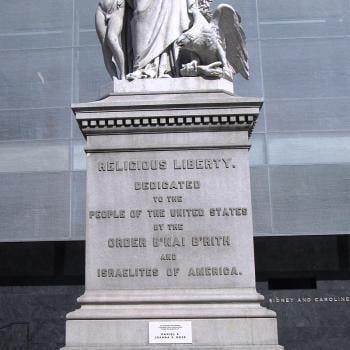Editors' Note: This article is part of the Patheos Public Square on the Future of Faith in America: New Religions. Read other perspectives here.
"The essence of faith is fewness of words and abundance of deeds." Bahá'u'lláh's profoundly simple explanation of faith — as enlightened action — will inform religious practice in the coming years.
Many Americans disconnect from faith precisely because the words of religious people often exceed their deeds. Yet the withering of faith leaves a void that can't be filled by the pseudo-religion of our time, an increasingly crass and empty materialism that has diminished the spiritual lives of individuals, fractured communities, and debased institutions.
So we hunger for meaning in our lives, for a profound experience of love in community, and for institutions that truly serve the public good.
Although religions will in general continue their decline in the coming years, the resulting emptiness will generate a hunger for authentic faith. But how can we rekindle an authentic expression of faith, one that contributes to the improvement of the lives of individuals, of their communities and institutions?
Baha'is are experimenting with a simple model of spiritual and social development — open to everyone — that we hope will make a contribution to the renewal of authentic faith. It starts with a simple action anyone can engage in: elevating everyday conversation. Everywhere we go, in the checkout line, around the dinner table, across the fence, or during coffee breaks, we can elevate our interactions and enhance social discourse, if only a little.
These conversations are a first step in a process of building a common understanding of reality, including the space we cohabit with our neighbors, families, friends, and co-workers. In elevated conversations we begin to identify the longing of people's hearts.
Perhaps their concern is a more meaningful life for themselves or their children. We then work together to learn how to make this happen. We learn to enhance our spiritual life through a systematic study of the word of God, and by transferring what we learn into constructive deeds.
Study can be accompanied by prayer, contemplation, and well-considered acts of service. We learn how to provide effective spiritual education for children and youth. We join together, in our homes or community centers, in simple, direct forms of worship that are inclusive of people of all religions, or no particular faith. This process helps us to overcome barriers of race, ethnicity, class, or religion, given its basis in an appreciation of the fundamental unity of humankind.
A key to our learning about transformation will be a systematic process of action and reflection. We try things and see what happens. We offer a class for the moral education of children. Do they come back next time? If so, why or why not? We make adjustments and try again.
In a sense, we are making efforts to build a new culture, but such efforts can't be reduced to a formula. Appreciating the unity of science and religion, we apply the methods of scientific enquiry to guide religious renewal.
Our fractured society would benefit greatly from the service orientation that can be instilled when hearts are motivated by authentic faith. By developing our moral compass as individuals, we also develop the capacity to be inclusive, responsible community members and trustworthy, service-oriented participants in institutions. In the future, the work that we do, the contribution we make, will be seen as acts of worship.
In the coming years, people of faith will be asked to focus their attention on an additional concern. We have entered what geologists are calling the Anthropocene era, an era in which people are the most significant force on the surface of the planet.
The human ecological footprint, our total impact on the planet, already exceeds Earth's capacity to support us sustainably by an estimated 60 percent. Over the next few decades, our population is projected to grow by 50 percent and our economy by 500 percent, at which time our ecological footprint would triple. Such growth would threaten the advancement of civilization.
Here, the reawakening of an authentic faith can play an essential role in responding to this crisis. Spiritual growth can replace material growth as a core cultural value. Consumerism, as a leading value, will begin to give way to a service orientation as people develop their inner life.
It has been said that the social and ecological landscape is a reflection of our collective "inscape." Over the next few years, Baha'is will add to our learning about the process of spiritual transformation. Over the coming decades, as we build our spiritual resources as individuals, and those of communities and institutions, we will begin to see the healing of our fractured social-ecological environment.
8/26/2015 4:00:00 AM




